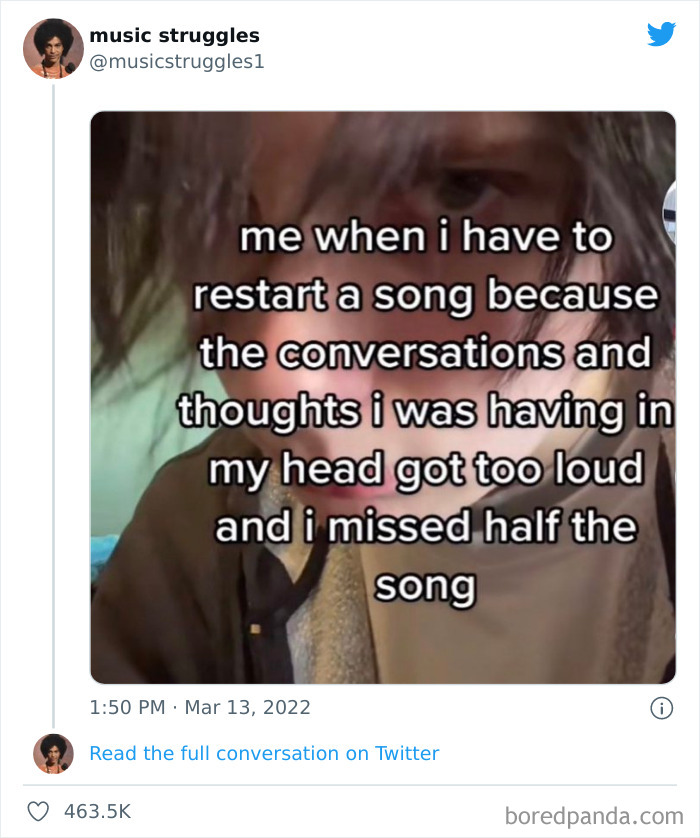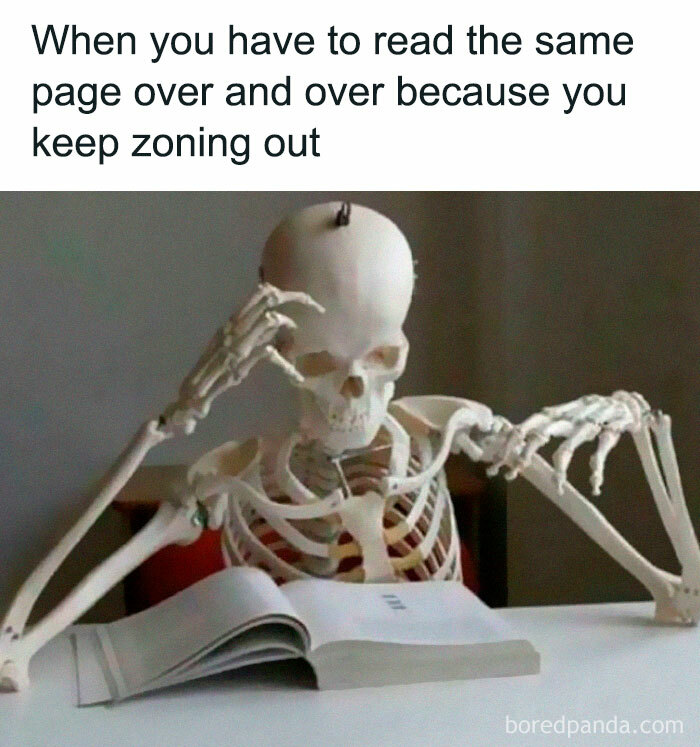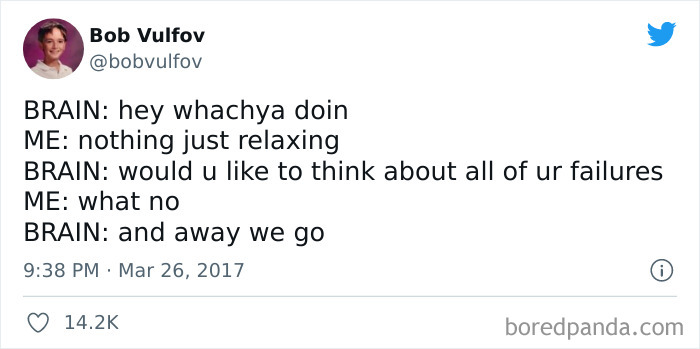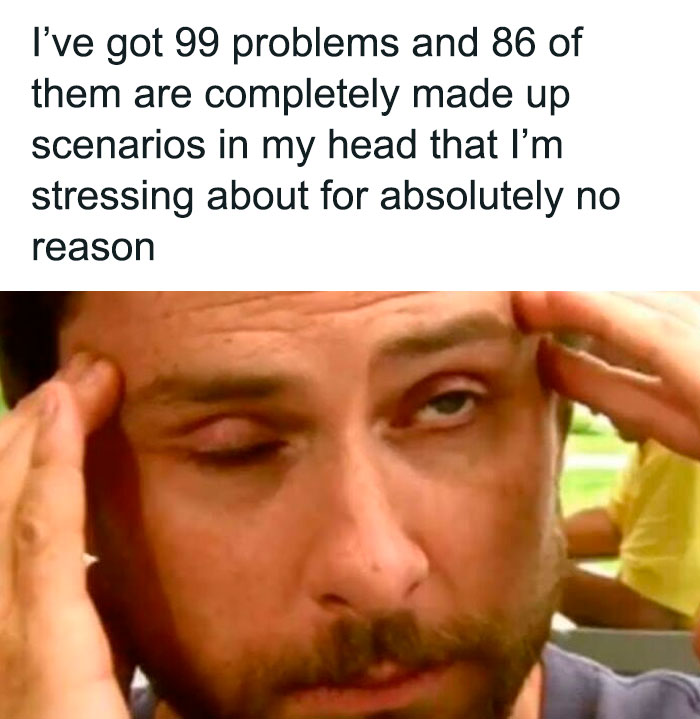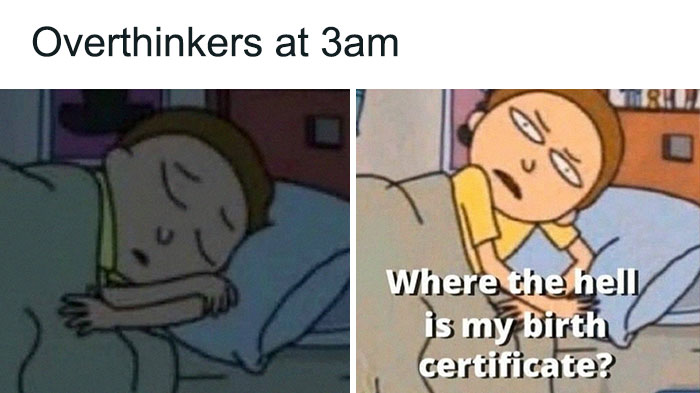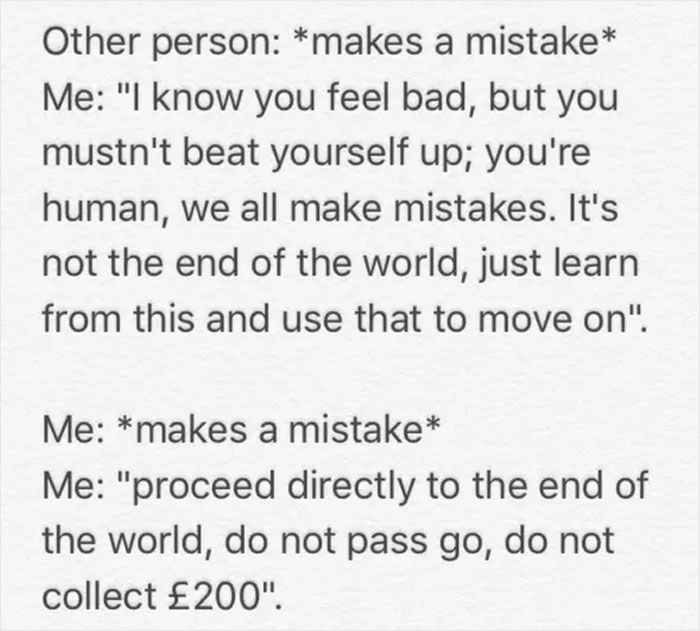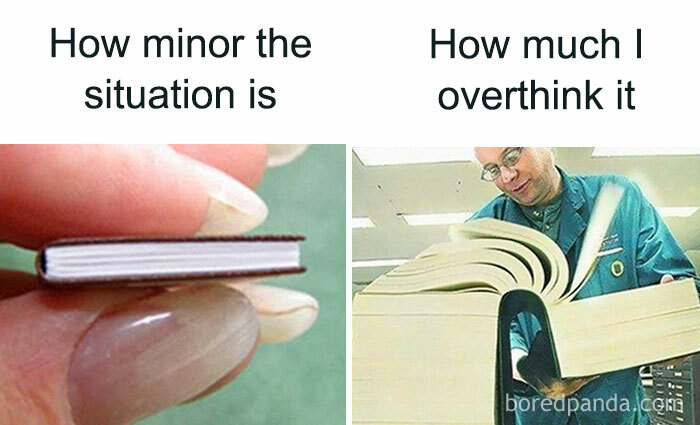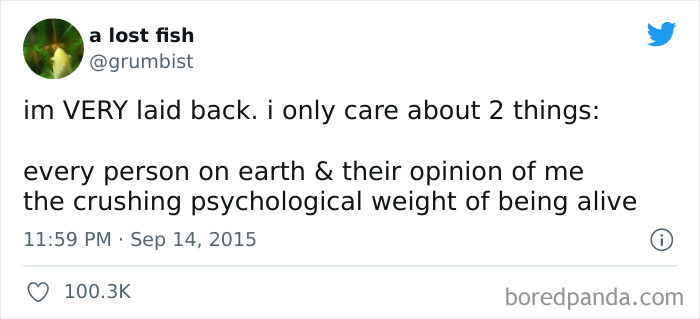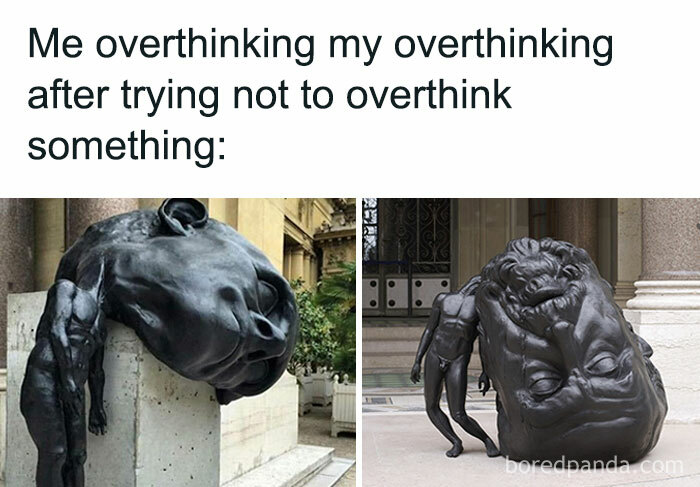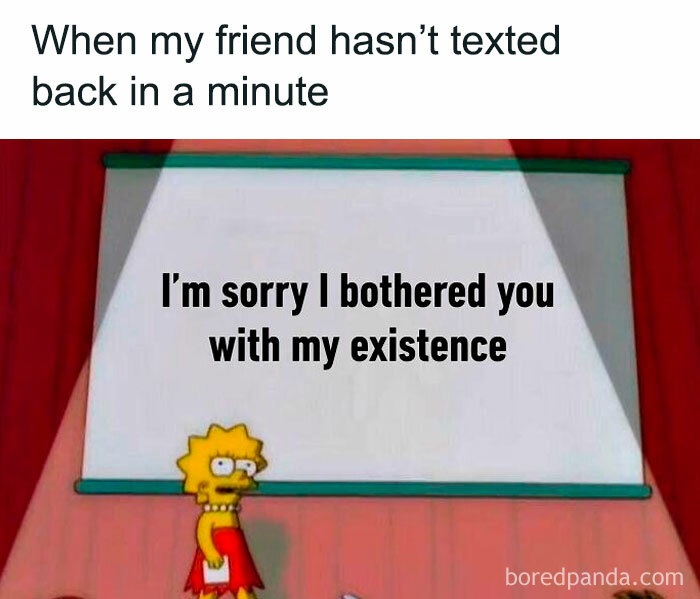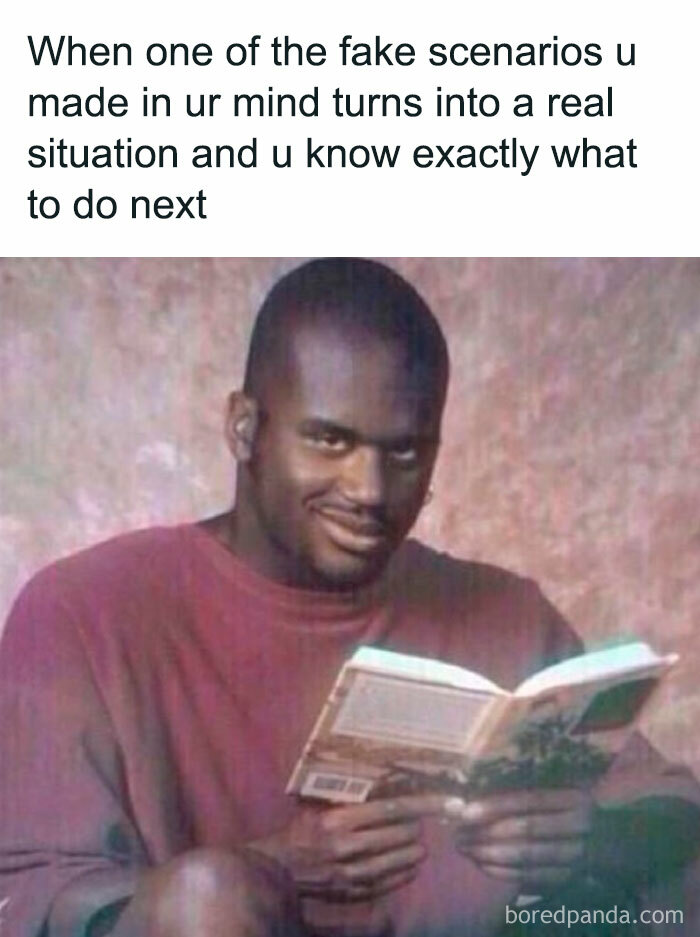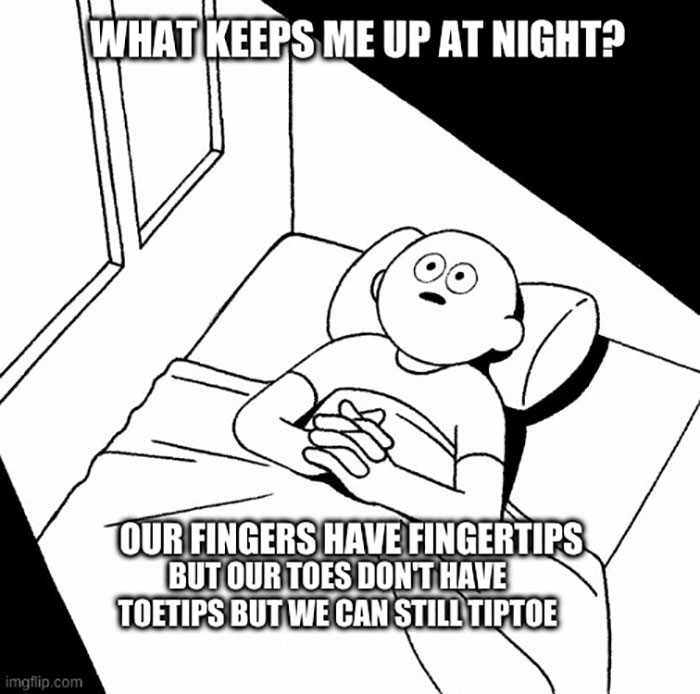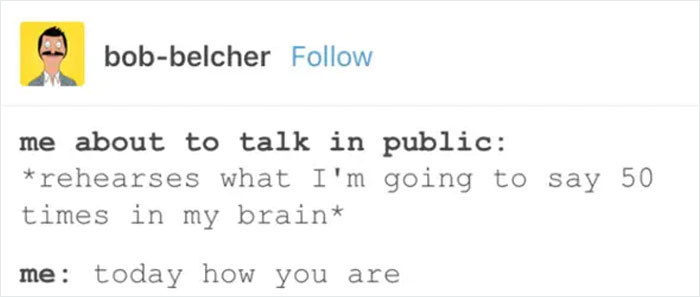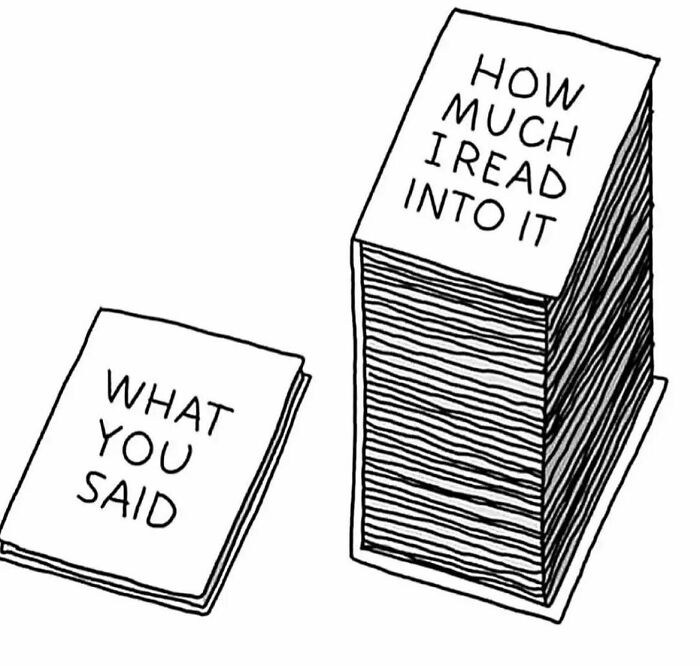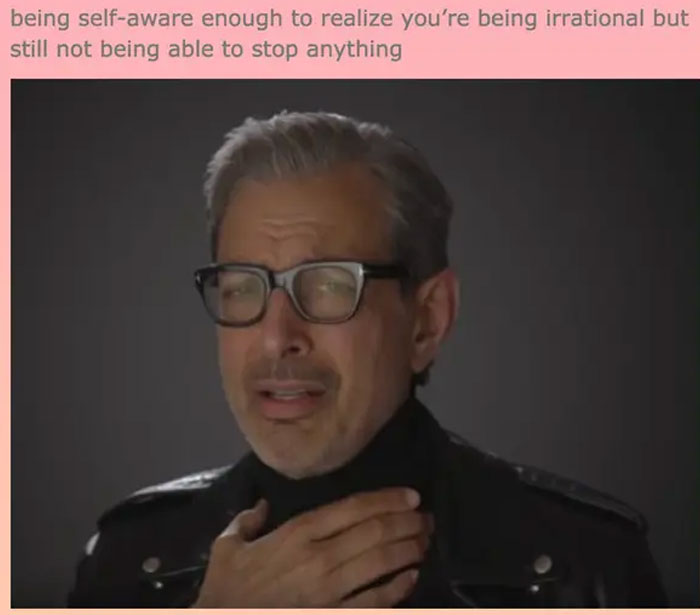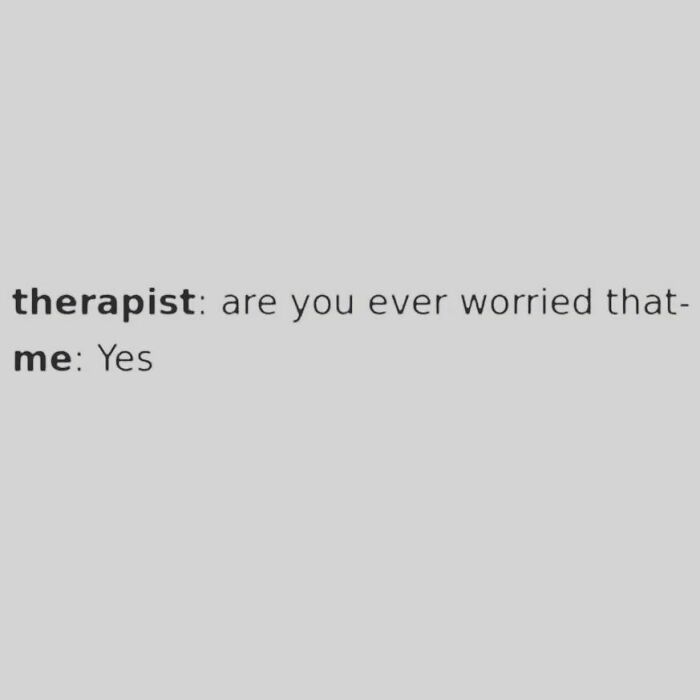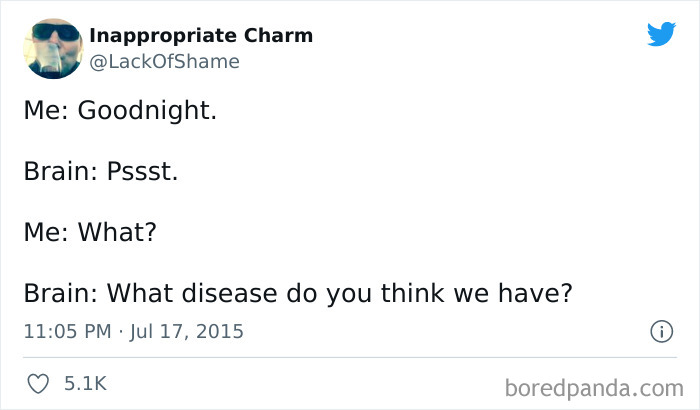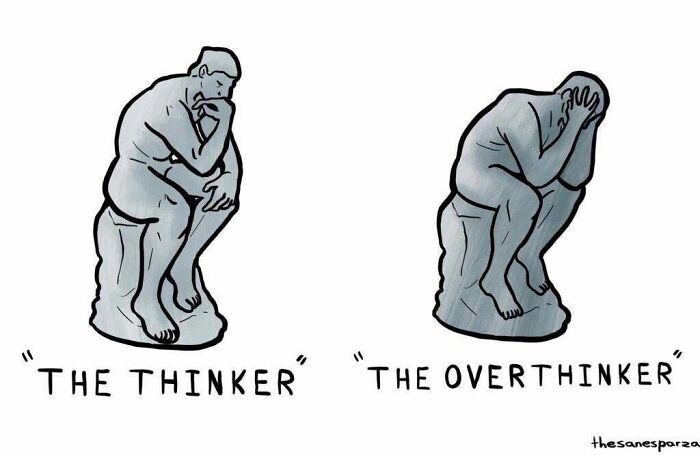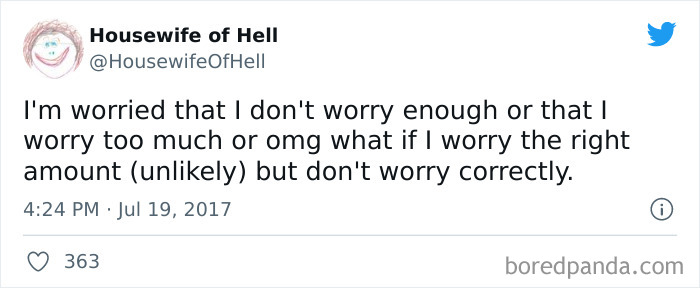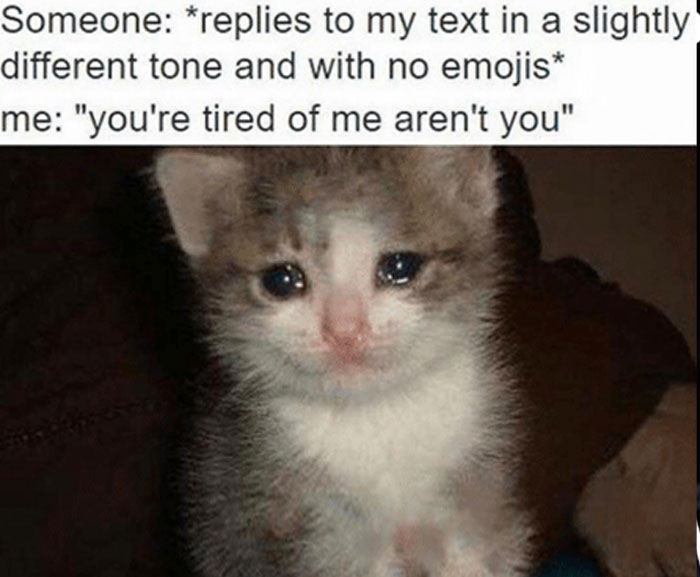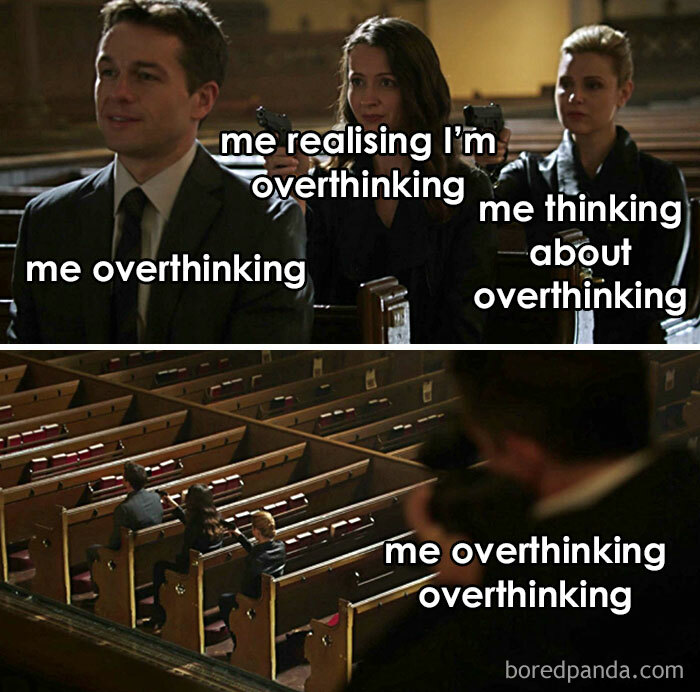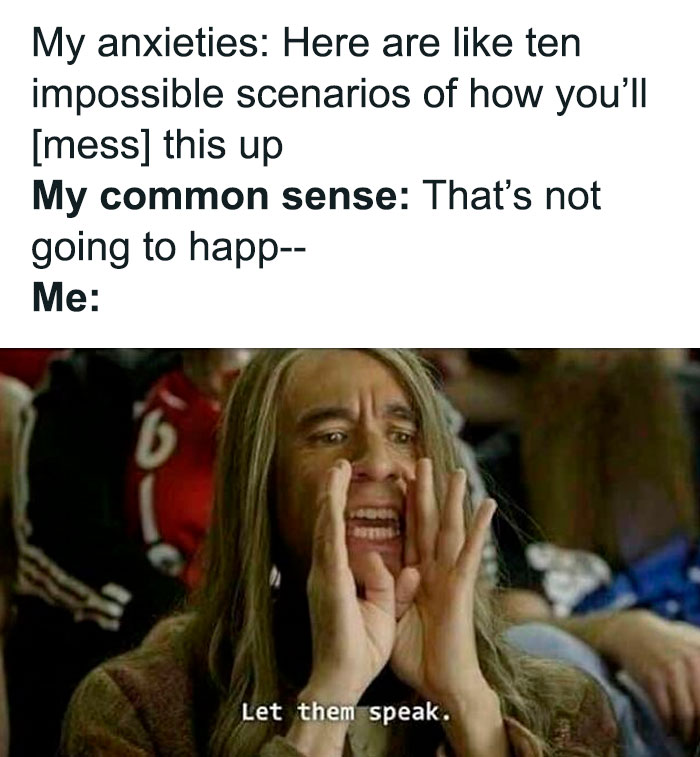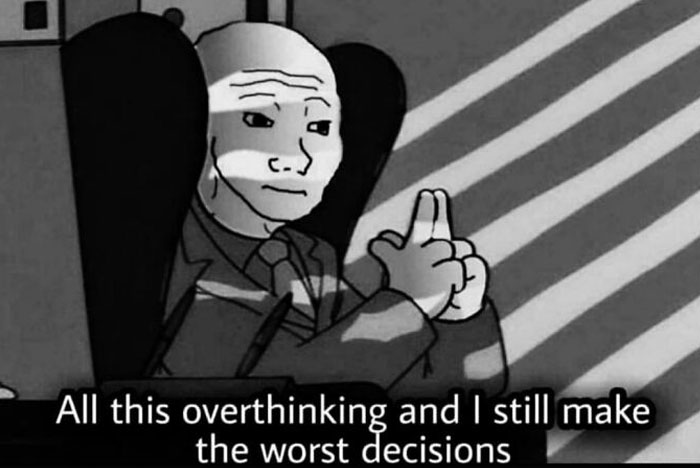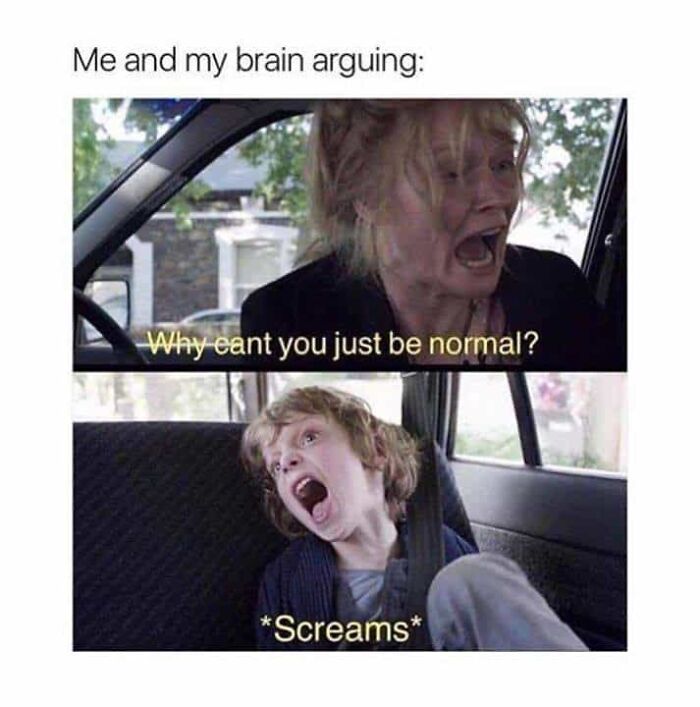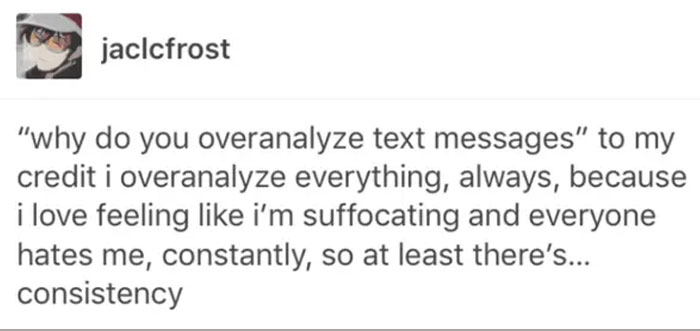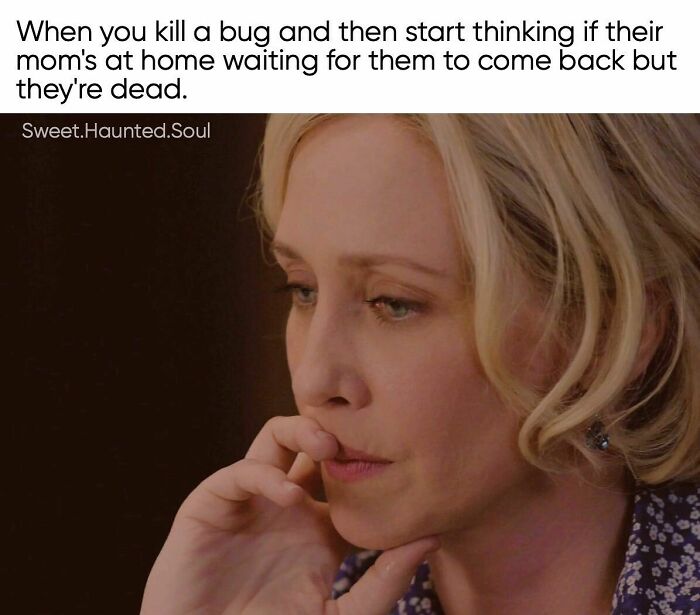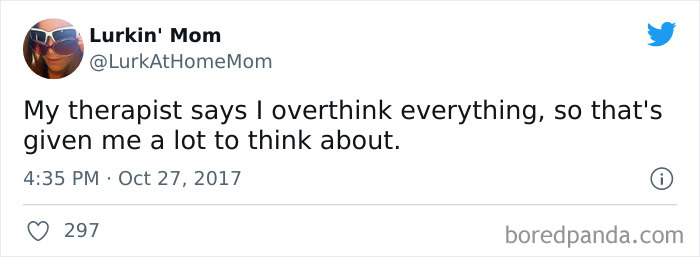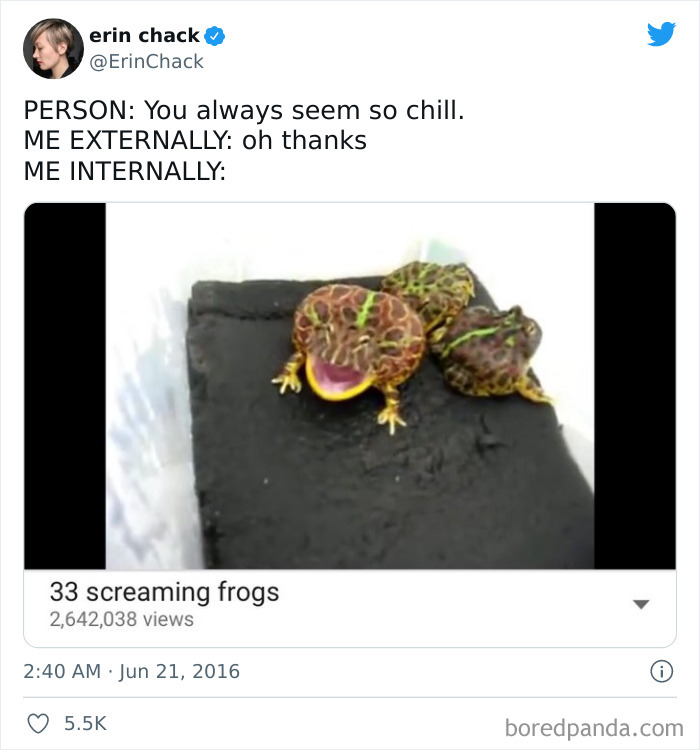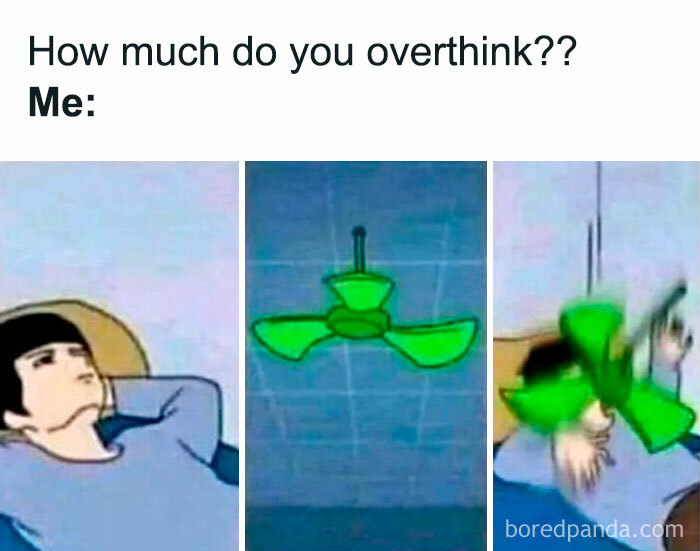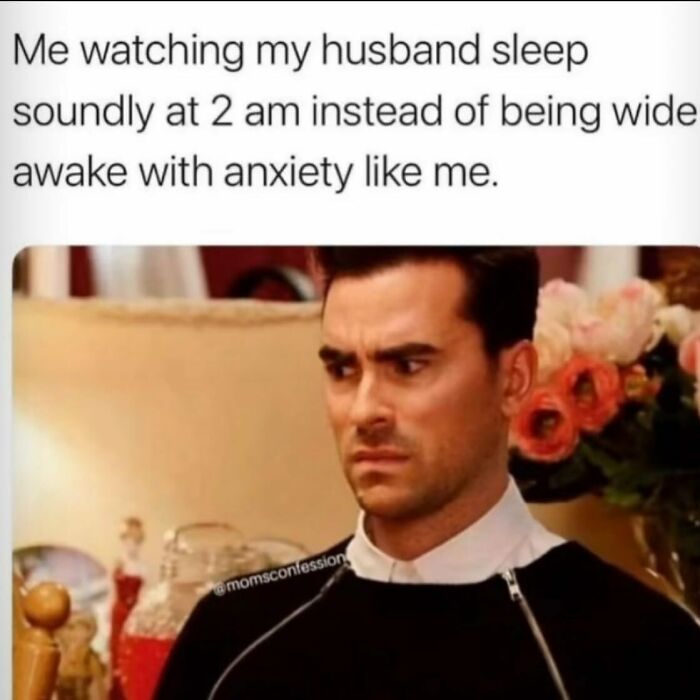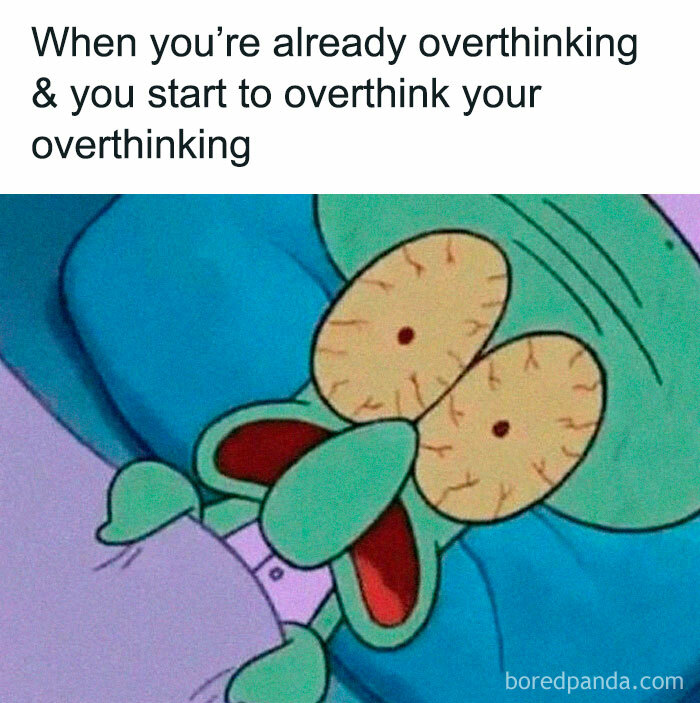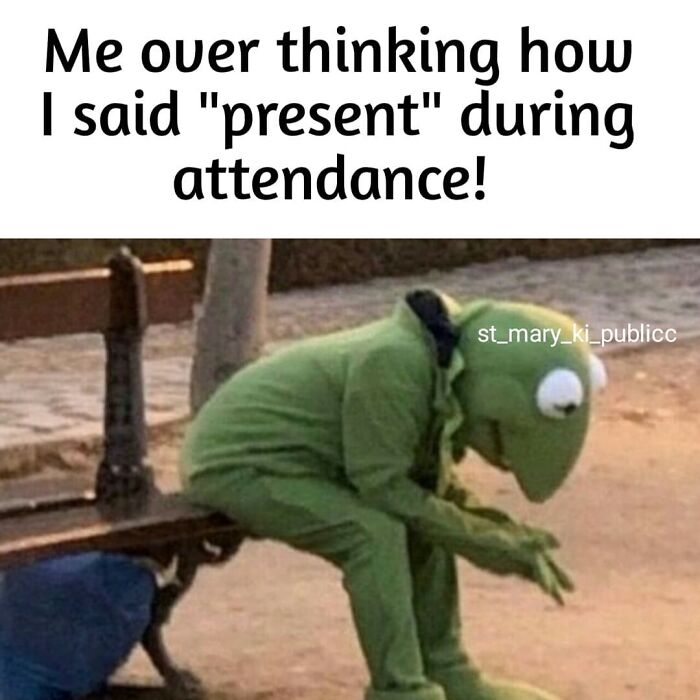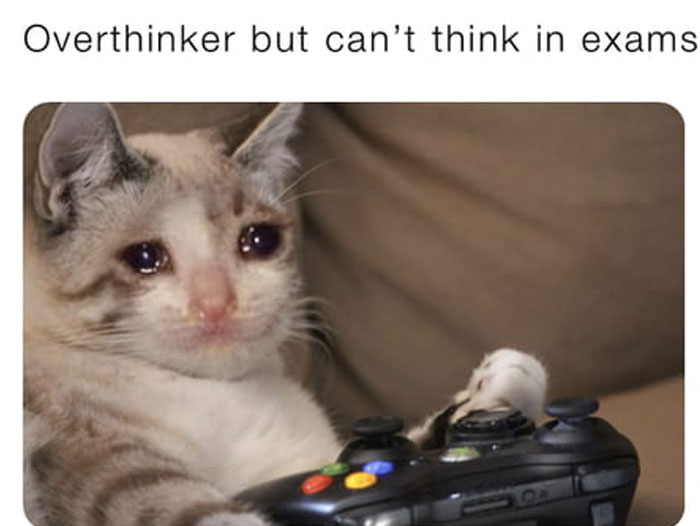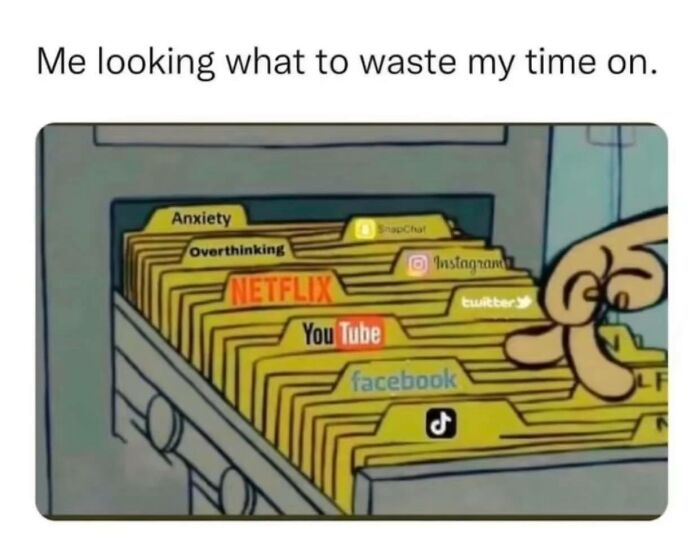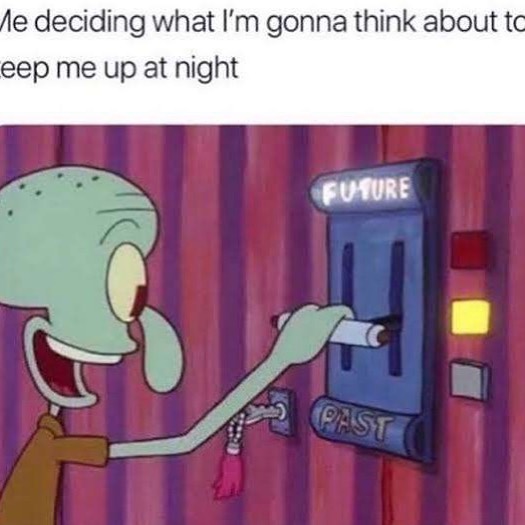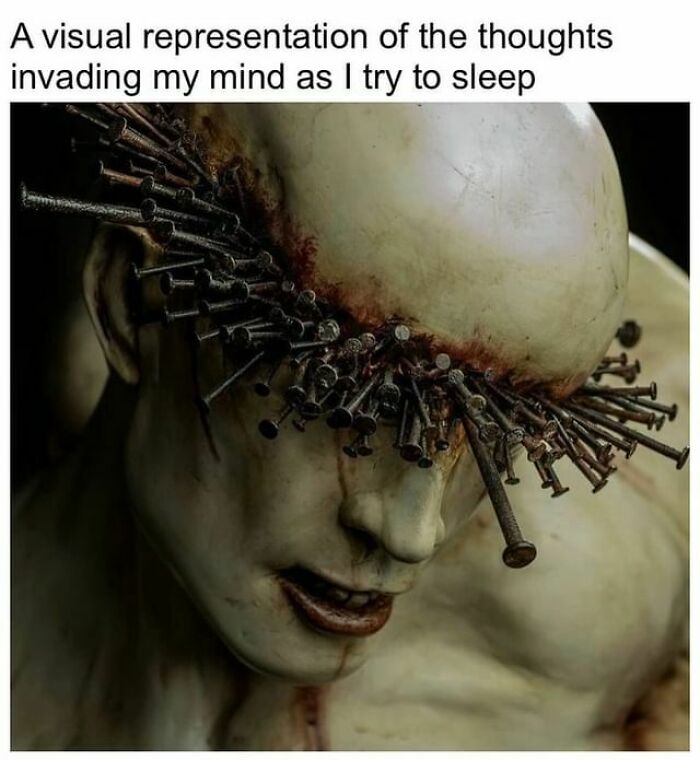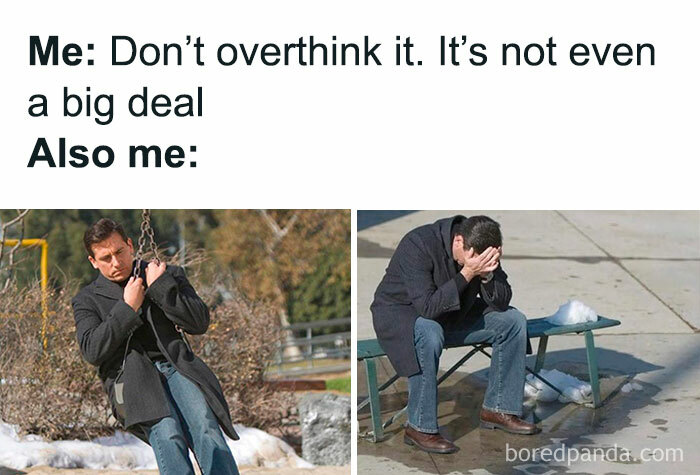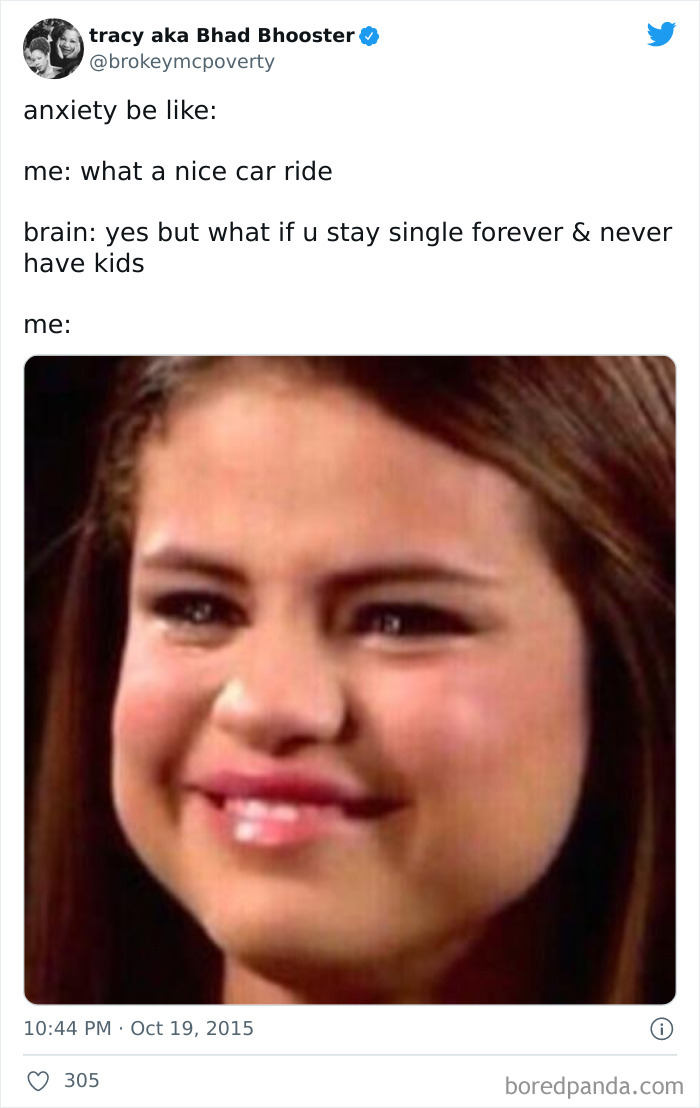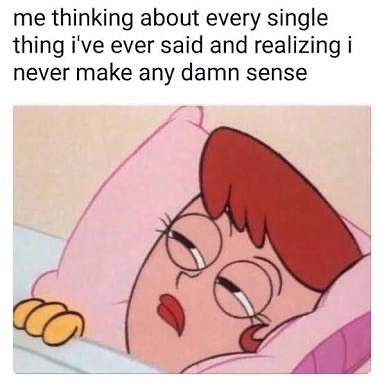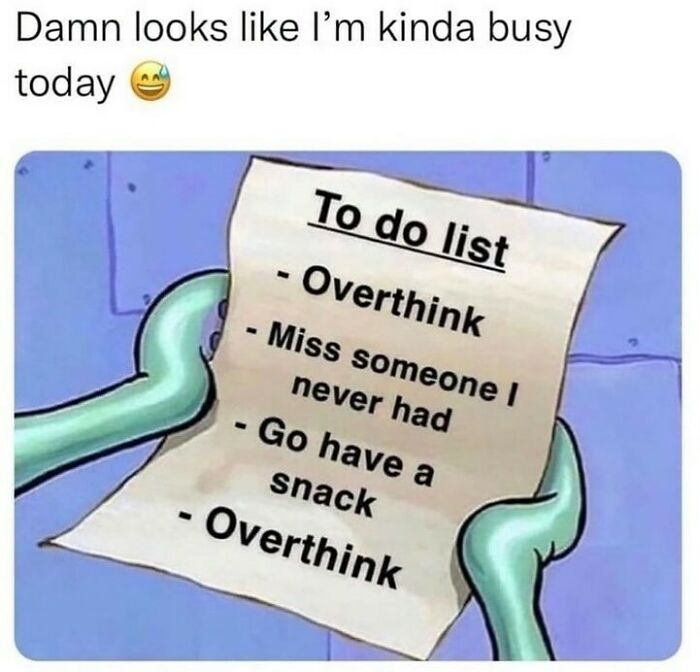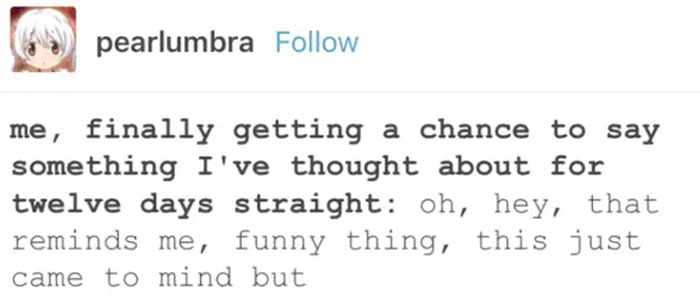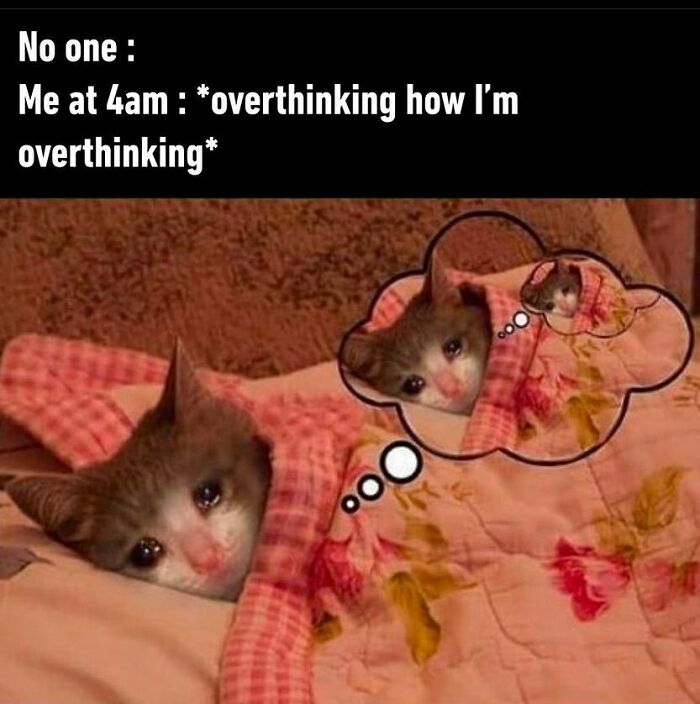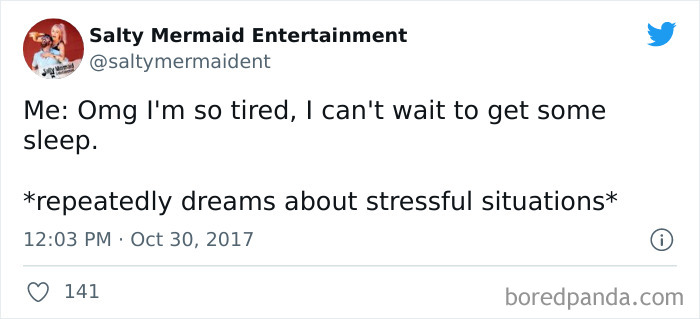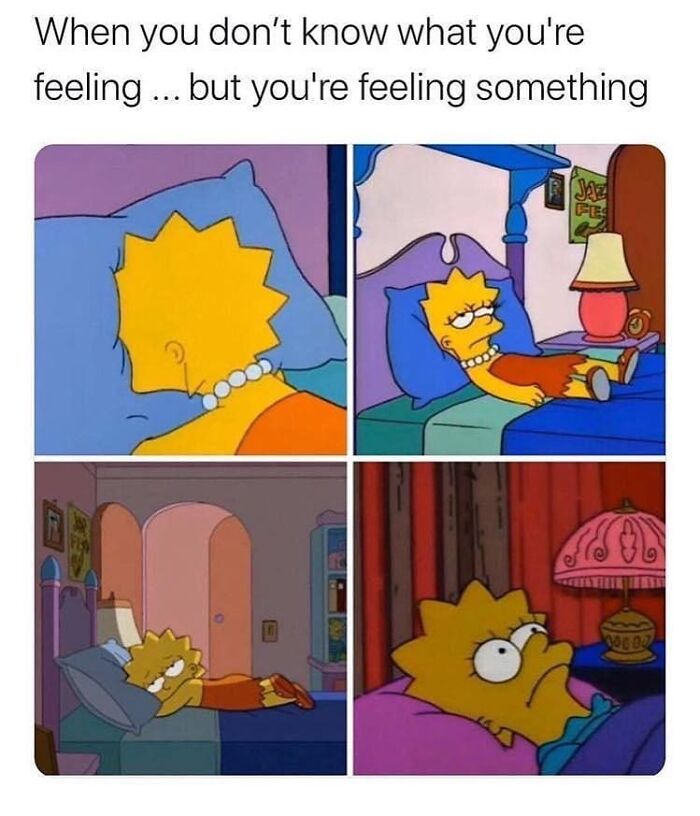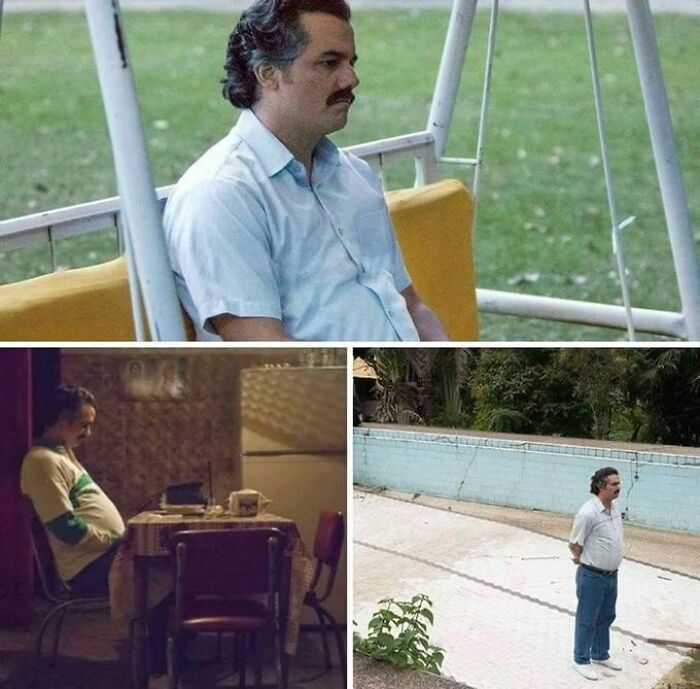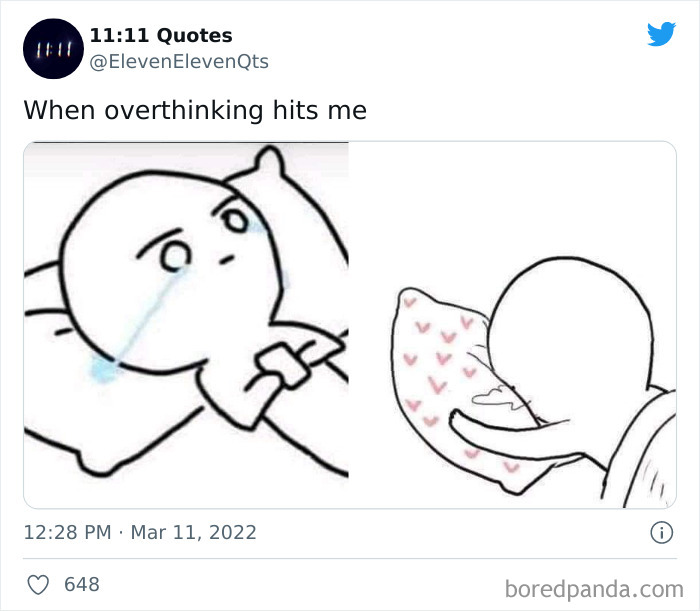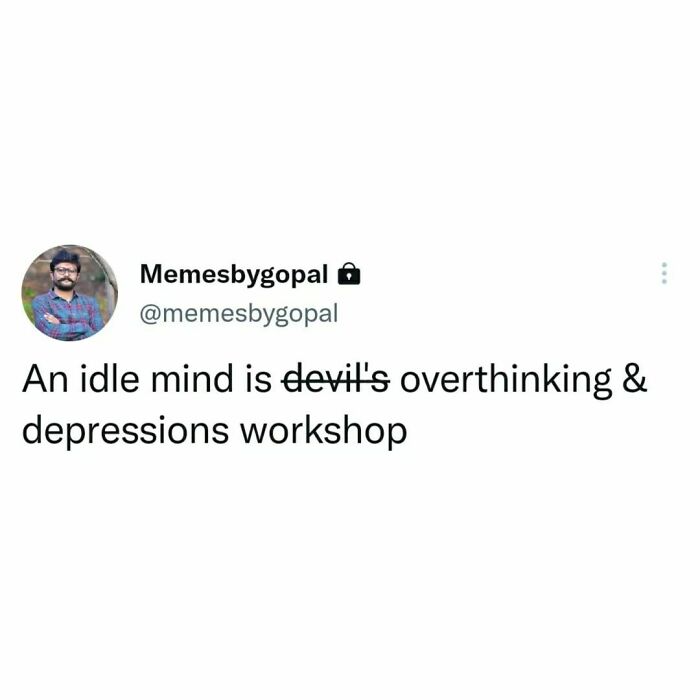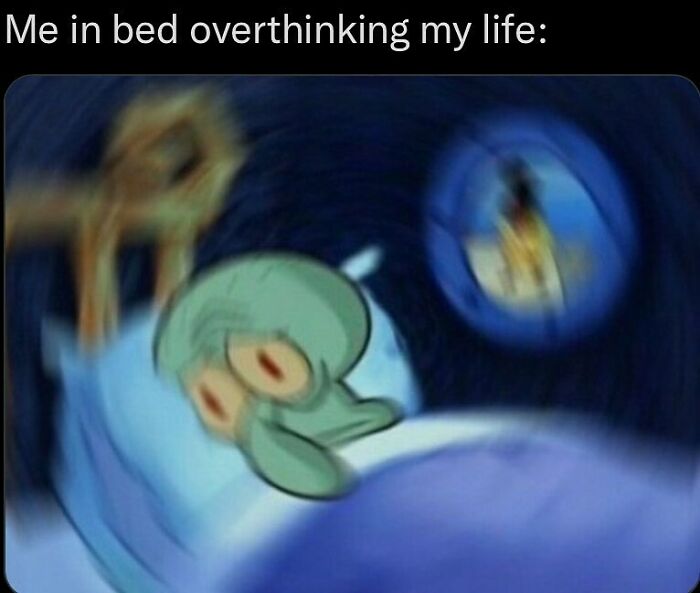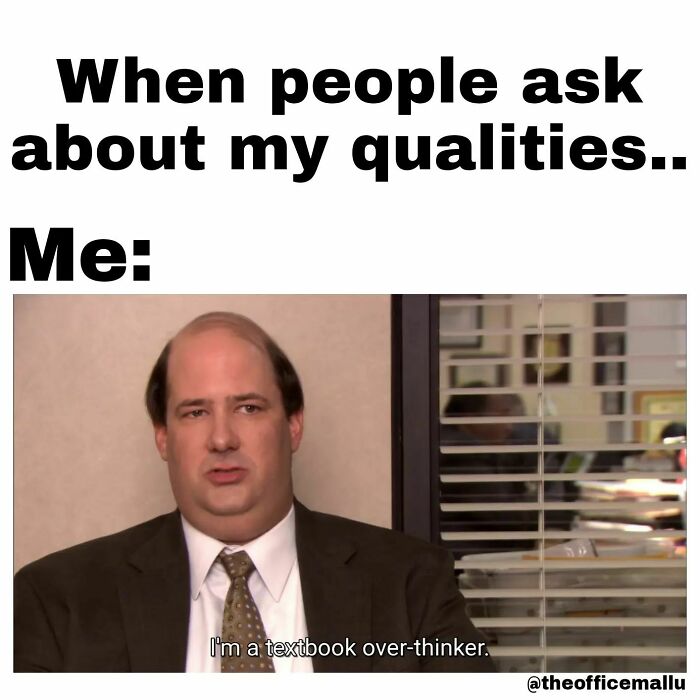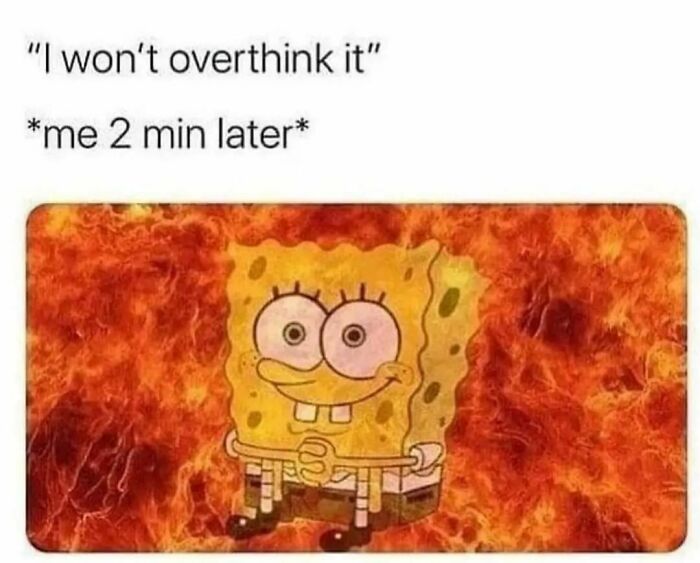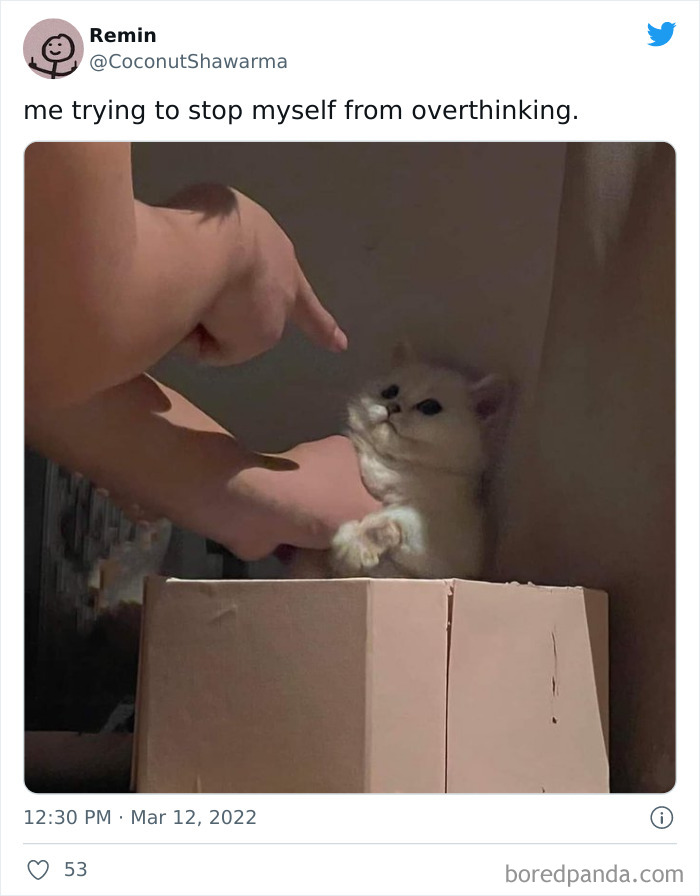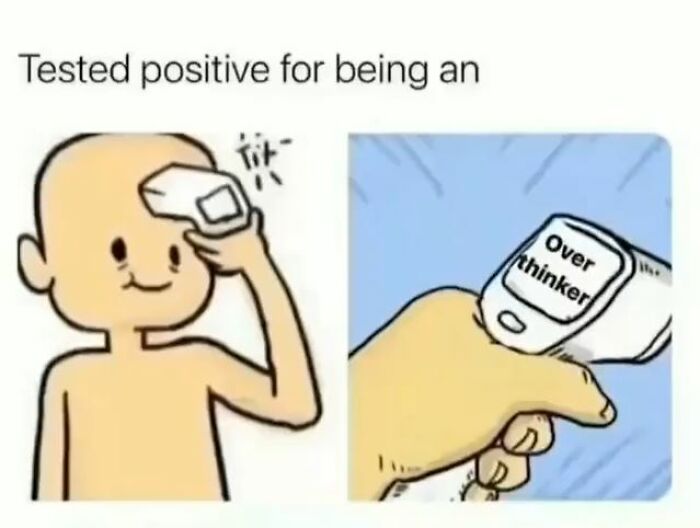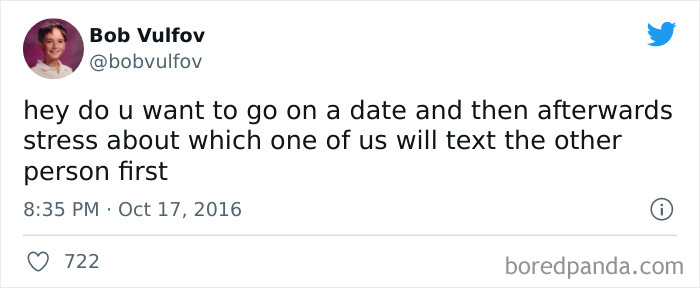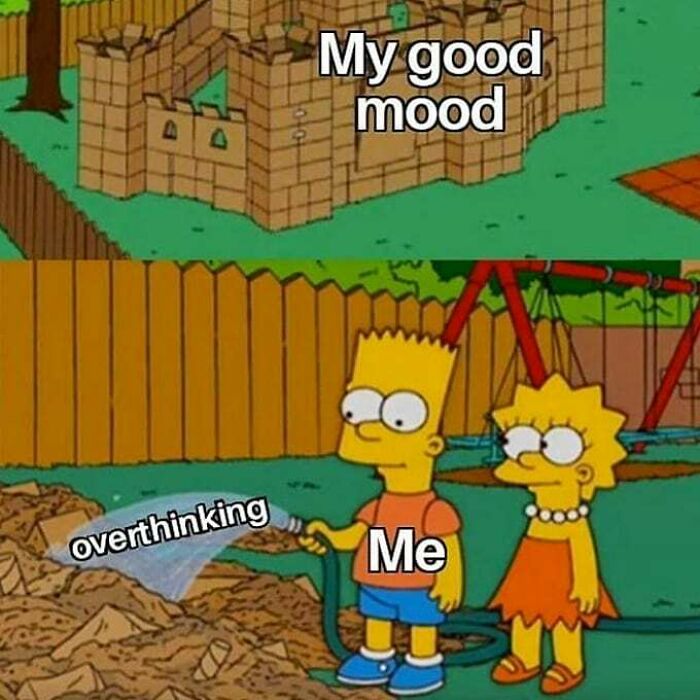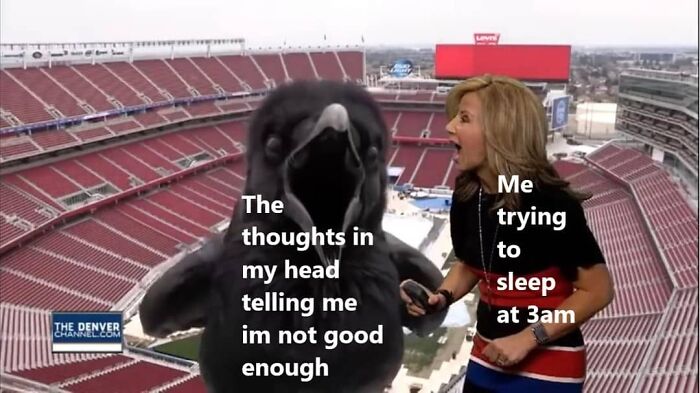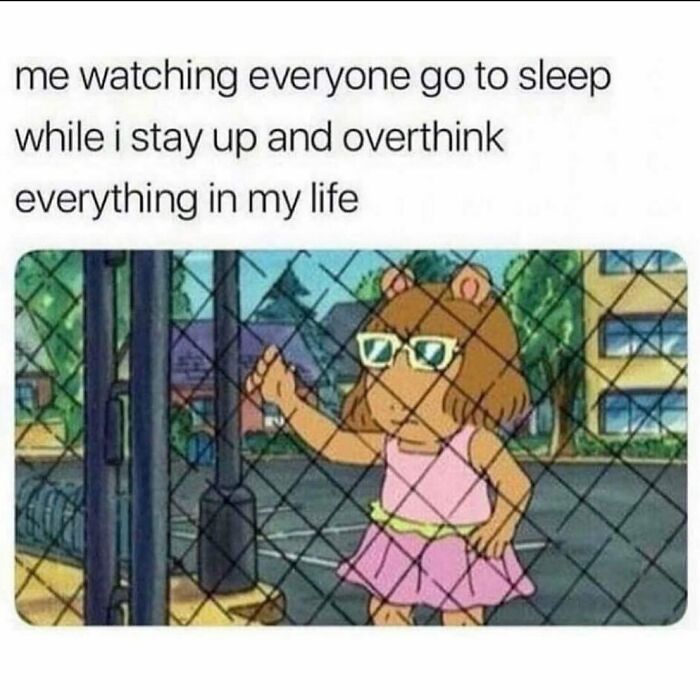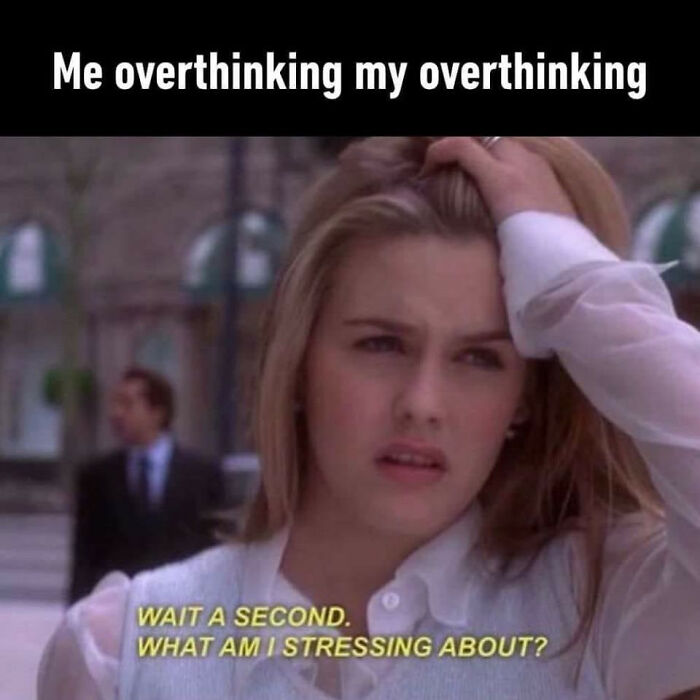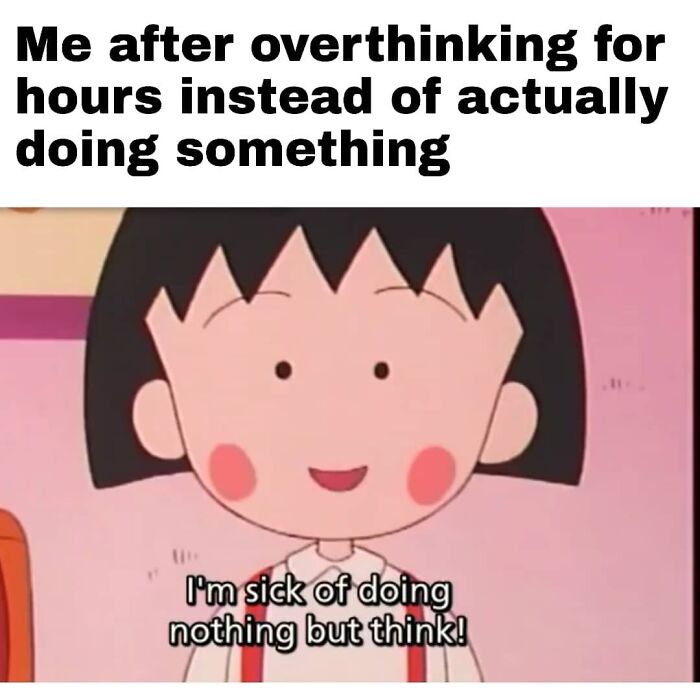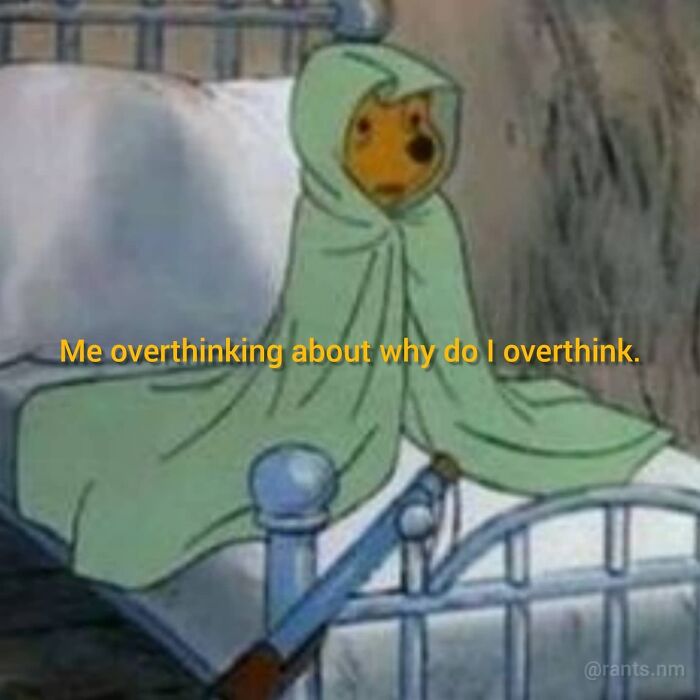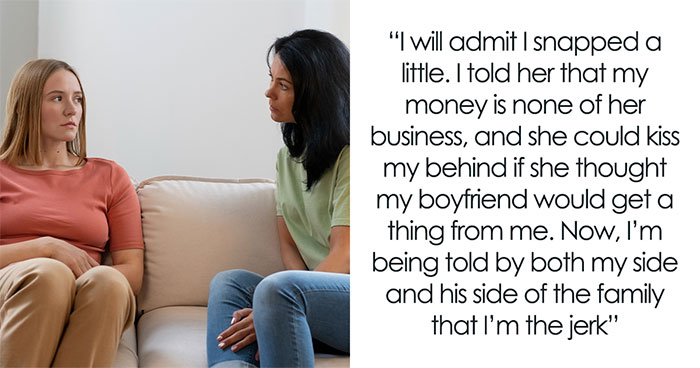Overthinking, analysis paralysis, and setting our imaginations loose to tackle problems that might not even occur are some of our biggest weaknesses. They lead to a lot of anxiety and, you could argue, they’re the symptoms of far bigger problems—deep-seated perfectionism and insecurity.
We’ve all made mountains out of molehills at some point in our lives, and it’s something that we’ve got in common, Pandas. To show you just how widespread overthinking is, Bored Panda has hand-crafted this list about the lighter, more comical side of it all. (We just hope it’s good enough for you; but what if it’s not? What are we going to do if someone doesn’t like our memes?!)
Scroll down and upvote your fave pics. And if you need an extra-long coffee break, don’t worry, we’ve got you covered, Pandas. You can find some more great jokes about being an overthinker right here. Enjoy!
Suzanne Degges-White, a Licensed Counselor, Professor, and Chair at the Department of Counseling and Higher Education at Northern Illinois University, was kind enough to explain to Bored Panda the consequences that overthinking, how it relates to anxiety and perfectionism, has and how to put a stop to it.
"One of the primary negative consequences of overthinking is that you end up missing opportunities! Overthinking can lead to procrastination as you try to examine choices or circumstances too closely and for too long. Overthinking can also lead to paralysis and not moving forward or taking a chance as the overthinking creates stress and anxiety as you spend too much time focusing on the 'What can go wrong?' versus the 'What Ifs' in life," Professor Degges-White told us how overthinking impacts daily life.
This post may include affiliate links.
According to Professor Degges-White, the relationship between overthinking and anxiety might not be as straightforward and clear as it might seem. What's more, overthinking exists on a spectrum: not all overthinkers are alike.
"Overthinking and anxiety have something of a 'chicken and the egg' relationship—if we're prone to anxiety, the more likely we are to engage in overthinking, and the more we overthink something, the more anxious we tend to become," she explained to Bored Panda.
"Overthinking, like a lot of tendencies, is on a spectrum. Some of us overthink things, but still commit to something before the metaphorical bell rings. Others, including those who tend towards obsessive compulsiveness, get so locked into overthinking that they can't move forward."
Professor Degges-White, from Northern Illinois University, told us that overthinking can be a product of performance anxiety, making the wrong choice, or past experience. What's more, it can also be the result of a natural tendency to over-analyze things.
"Perfectionists are definitely overthinkers as they worry about minor flaws and what they can do to avoid them. Perfectionists can get tripped up by their need to achieve perfection and focus on the minor details and be unable to fully commit to something, whether it's turning in a project at school or work or committing to a relationship if they feel it or they or their partner isn't 'perfect.'"
The first step in fighting back against our tendencies to overthink and over-analyze things is to realize that we do, in fact, overthink things. "Once you realize you are overthinking things, it's time to tell yourself that 'enough is enough.' Our minds will go where it's comfortable for them to go—and for whatever reason, our brains seem to enjoy worrying a bit."
Professor Degges-White shared some great tricks to get out of the habit of overthinking:
- "Replace the worries of 'what can go wrong' with thoughts about 'what could go well.' Rather than wasting mental energy on negative thinking—especially when it's cyclical and going nowhere—intentionally remind yourself to focus on the positive possibilities.
- Accept that your best effort is enough and that perfection in most things isn't achievable. And that's okay.
- When trying to make a decision, practice going with the first response that comes to mind. Most of us do know what we want to do, but let our heads get tangled up in knots by overthinking the possibilities—just follow your gut and see what happens.
- Set a time for thinking about a problem. When you contain the "space" for overthinking, you give yourself parameters and lose less time in overthinking and deliberating. Some people begin to stop the overthinking well before the timer goes off—they learn that it's not productive."
Professor Degges-White went in-depth with Bored Panda about overthinking during a previous interview as well.
"Most humans do tend to ruminate on the negative things in life. In fact, one research study indicated that we’d need to hear '5 good things' about ourselves to undo the emotional hold from a single 'negative thing' that happened. It’s called the negative bias effect," she told Bored Panda.
"Part of this comes from anxiety related to avoiding making the same mistake in the future, but the more we concentrate on the past error, the more ‘familiar' the error becomes and the more likely we might be to repeat it. Our brain goes where we train it to go,” she explained.
And now I want to go to Brussels to see this thing in person. (Egmont Garden, by Thomas Lerooy)
The professor warned that "if you are too wrapped up in overthinking a situation you may absolutely miss an opportunity." In short, over-analyzing situations can mean that we become blind to the world around us. And that can, in turn, impact our quality of life.
"When we devote all of our mental energy to going through every possible outcome of a decision, there’s a chance that we’re going to talk ourselves out of doing anything, due to the almost magnetic attraction fearful outcomes have with our brains,” she went into detail how overthinking can then lead to us becoming more fearful, more passive.
"Some people are absolutely unable to make a decision, though, because they know—at some level, if not consciously—that by making a decision they have eliminated all other possible pathways,” Professor Degges-White said.
I can't read people for beans. They're a complete enigma. Which means I'll be trying to figure out what you meant, the subtext and tone for days after the conversation. It is why I prefer blunt to sugar coat. i'm never going to read between the lines. At least not accurately.
You got only this much? My mom would buy this world two times if this were an actual job.
“However, they might fail to realize that by _not_ making a decision, they have actually made a decision—and shut down all potential possible outcomes," she said that there is no such thing as not making a decision. Each action or inaction has consequences. Some of which we might not be aware of.
yes! that was the relationship between me and sleep for far too long! : )
"To reduce overthinking, we need to train ourselves to trust our first impressions and instincts—and commit to a decision," she gave some spot-on advice on how to fight back against over-analyzing certain situations. We need to learn to trust our gut instincts more.
I used to sometimes get really worried about scurvy. I'd go out and get an orange and feel like I'd dodged a bullet.
Oh fudgity fudge Why am I on Bored Panda instead of studying? But why am I pressuring myself to study all the time? But if I'm studying all right, then where are the marks? But marks are not important, life is. But if I'm living life, then how am I going to get a job?.....
"We need to recognize that the longer we ponder, the more confused we are likely to get. Thus, we should practice making the decision that feels right and learning from the new behavior. Creating new patterns in who we approach life isn’t always easy, but we can train ourselves to do things differently with practice,” she said.
Me overthinking it all together when going to bed *An airplane with an A-bomb flying above the church*
In the professor’s opinion, overthinking may be tied to the fact that we have more time for leisure than ever before.
“We have a lot more time to think than other generations—when people were super involved in the physical acts required in 'making a living'—when this meant rising early, physical labor all day, and no time for luxuries such as 'creative thought,' 'rumination,' or video game playing or mindless television watching. Life didn’t give space for a lot of overthinking—life was uncertain and you had to act quickly and instinctively, in many cases,” she explained to Bored Panda.
"Overthinking is probably part product of increased leisure time, advances in cognitive complexity, and the ridiculous array of choices that life now presents us. When you had to worry about protecting crops, livestock, feeding a family, and making do with what you had, you don’t have the time worry about the trivial things that modern man has the luxury of overthinking."
me to other ppl: dont think about the problem, think of how to solve it also me: but what if a giant rock fell over my head and killed me
Or if they were returning home to their spouse and kids but they were crushed so their whole family is worried sick
Looking left and right for friends' helps, and up for God's miracle
In that case, I'm living on borrowed time with the rest of the pandas.
Mean while, school nurse: Here's an ice pack for your depression
What do you mean not a big deal? It is a big deal. They said "enjoy your meal" and I said "thanks, you too" now I can never go back to that restaurant. What if I see the person in public?
I um... just saw this in my news feed....um....come to think of it....
I can text easily with close friends, but with somebody I think I am friends and want them to like me this is what I do
This is it right here..... What is that feeling? Just comes & goes
"When you have a conversation with someone and then can't stop replaying it over in your head with how it could've gone better"
HA JOKES ON YOU! I DONT KNOW HOW TO PLAY CHESS! MUAHAHAHHAHAHHAHAHAHAHHAHAHAHHAHAHAHAHHAHAHHAHAHAHAHAHAHAHAHAAAHAHAHAHAHHAHA
If this is how overthinking is I'm pretty sure i already deep fried my brain.
Wait till you get to the part where you have to CHOOSE what to watch!
Most people think "that little voice in your head" is your concience telling you how to be a good person. My internal voice just reminds me for the eighteen millionth time today that i am going to die (not soon enough) and everyone hates me, but not as much as i hate me.
GoooooD Mythical Morning! Today we are founding out if these thoughts in our minds should make us laugh or cry
Load More Replies...My daughter has ocd. Her overthinking is next level. I feel so bad for her when it's really bad. The connections she makes w something so small that has happened or was said is exhausting for her. The compulsion she has is to tell me about every thought in detail when she's having a particularly hard time. She's getting better though. This was a recent diagnosis and we both felt some relief bc now we can tackle it head on. She has a great therapist and she's getting her dna results back soon ti see what meds will agree w her body. I feel very guilty bc I feel like I passed my anxiety on to her.
I have OCD as well. I can relate to your daughter and I'm glad that you're helping her dealing with it. That alone makes you a good parent. Please know that it is not your fault. No need to feel guilty. We don't know for certain what causes OCD yet and we all have anxietys in our lives sooner or later. All the best to you and your daughter.
Load More Replies...GoooooD Mythical Morning! Today we are founding out if these thoughts in our minds should make us laugh or cry
Load More Replies...My daughter has ocd. Her overthinking is next level. I feel so bad for her when it's really bad. The connections she makes w something so small that has happened or was said is exhausting for her. The compulsion she has is to tell me about every thought in detail when she's having a particularly hard time. She's getting better though. This was a recent diagnosis and we both felt some relief bc now we can tackle it head on. She has a great therapist and she's getting her dna results back soon ti see what meds will agree w her body. I feel very guilty bc I feel like I passed my anxiety on to her.
I have OCD as well. I can relate to your daughter and I'm glad that you're helping her dealing with it. That alone makes you a good parent. Please know that it is not your fault. No need to feel guilty. We don't know for certain what causes OCD yet and we all have anxietys in our lives sooner or later. All the best to you and your daughter.
Load More Replies...
 Dark Mode
Dark Mode 

 No fees, cancel anytime
No fees, cancel anytime 







